AMD Ryzen 9 9950X Vs 7950X: What’s New and Why It Matters
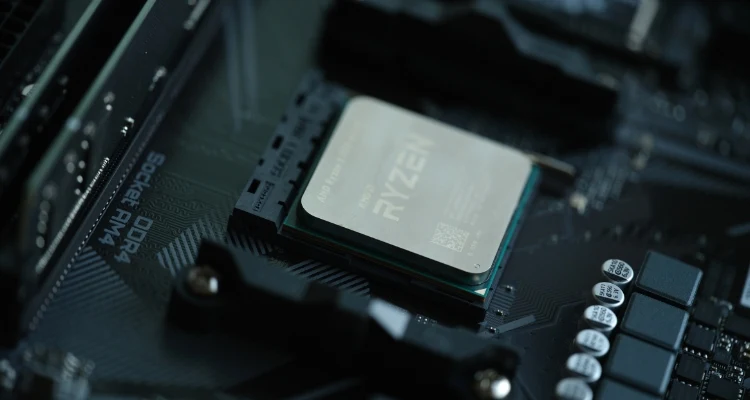
Ryzen 9 series has been the peak of AMD’s architecture, with each new processor pushing the limits of computing performance regarding power and speed. With its most recent release–Ryzen 9 9950X, AMD has introduced the Zen 5 architecture, offering improvements over its predecessor, the Ryzen 9 7950X.
At ServerMania we know that choosing the right hardware is critical for you, whether you’re going to play demanding games or run high-end workflows. In this guide we’ll walk you through the key differences between AMD 7950X and 9950X, exploring how these two CPUs compare in reality.
Stay with us as we’re about to unwrap everything from reasons to upgrade to benchmarks and efficiency!
Why the Ryzen 9 9950X is the Next Step Forward
The AMD Ryzen 9 9950X isn’t just another processor–it’s a clear upgrade over the 7950X, built for businesses and developers who need higher efficiency, improved memory capacity, and better workload optimization.
While the 7950X remains a powerful option, the 9950X brings next-generation Zen 5 architecture, increased instructions per cycle (IPC), and enhanced performance efficiency, making it the ideal choice for demanding applications and future-proofed infrastructure. If you’re looking to maximize performance and scale your operations, upgrading to the Ryzen 9 9950X is a strategic move that ensures you’re ready for the future of high-performance computing.
| Feature | Ryzen 9 9950X (The Future of Performance) | Ryzen 9 7950X (Previous Generation) |
|---|---|---|
| Architecture | Zen 5 – Next-gen performance & efficiency | Zen 4 – Older architecture |
| Memory Support | 256GB DDR5 Support – Handles larger workloads | 128GB Max – Limited scalability |
| Performance Gains | More Instructions Per Cycle (IPC) – Faster across workloads | Slower IPC improvements |
| Future-Proofing | Optimized for AI & Data Processing | Lacks AI-driven enhancements |
| Workload Optimization | Better multi-threading & efficiency | Not optimized for modern workloads |
AMD Ryzen 9950X Vs 7950X Specs
To determine which is going to be the best option for you, we need to review and compare both processor’s specifications. We will explore everything from the core count and number of threads to max clock speed, memory support, and both CPU’s thermal margin.
| Processor: | AMD Ryzen 9 9950X Specs | AMD Ryzen 9 7950X Specs |
| Image: | 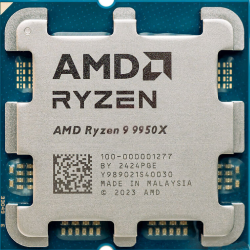 | 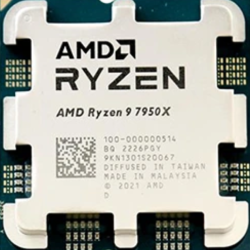 |
| CPU Codename: | Granit Ridge | Raphael |
| № of CPU Cores: | 16 | 16 |
| № of CPU Threads: | 32 threads | 32 threads |
| CPU Clock Speed: | 4.3 GHz | 4.5 GHz |
| CPU Clock Boost: | Up to 5.7 GHz | Up to 5.7 GHz |
| CPU Memory: | DDR5 (5600 MT/s) | DDR5 (5200 MT/s) |
| Thermal Margin: | 95°C – 203°F | 100°C – 212°F |
| CPU L1 Cache: | 1280 KB | 1024 KB |
| CPU L2 Cache: | 16 MB | 16 MB |
| CPU L3 Cache: | 64 MB | 64 MB |
With the clear breakdown of both processors’ specifications, it’s clear that both Ryzen 9 7950X and offers higher memory support and architectural improvements, but the 7950X remains strong with caching, clock speed, and thermal margin.
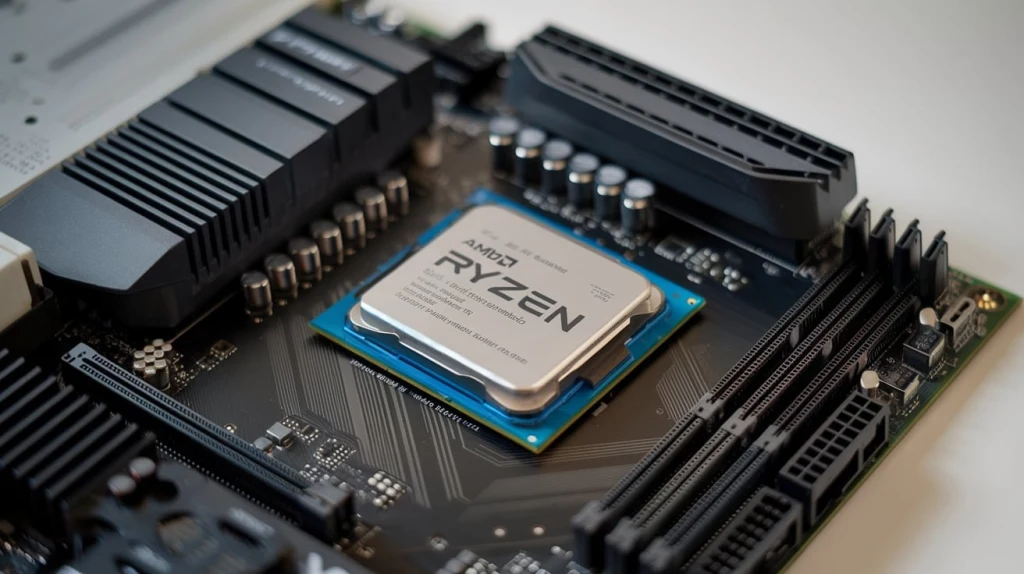
Ryzen 9950X vs 7950X – Architecture Comparison
While AMD Ryzen 9 9950X and 7950X share similar performance, the underlying architecture sets them apart, enabling 9950X support for futuristic workloads. From the Zen 5 implementation and clock speed to integrated graphics and smaller processing nodes, let’s break down the key architectural differences.
- Architecture – Ryzen 9 9950X provides the ultimate performance boost, fueled by the AMD Zen 5 architecture, while 7950X uses the old AMD Zen 4 architecture.
- CPU Socket – The compatibility between both Ryzen 9 processors is the same, while both require the AM5 Socket with 1718 pins for connection to the motherboard.
- Clock Speed – The Ryzen 9 7950X has a slightly higher base clock speed when compared to the 9950X, which is 4.7% or 0.2 GHz, with the same core speed boost up to 5.7 GHz.
- Processing – With Ryzen 9 9950X, AMD employs the advanced 4nm FinFET technology, while 7950X uses the limited 5nm FinFET technology for its cores.
- Graphics: Both AMD Ryzen 9 processors offer matching built-in graphics (iGPUs), with 2 graphic cores and a limited frequency of 2200 MHz.
In the end, while both Ryzen processors deliver top-notch performance, Ryzen 9950X brings essential architecture improvements. However, Ryzen 7950X still stays strong with a higher base clock speed, and proven reliability, which makes both processors a solid solution for any type of workload or server.
7950X vs 9950X Performance Analysis & Benchmarks
With the performance specifications and architecture aside, it’s time to dive deep into real-world applications such as gaming. This will provide you with a clear insight into how both CPUs perform under heavy utilization and thermal stress, allowing us to review all important output factors!
Gaming Performance
We are now ready to put both processors against each other in a gaming comparison. To perform accurate performance testing, we’ll use the 1080p resolution and exactly the same configuration.
Here’s our testing configuration:
- OS – Windows 11
- GPU – RTX 4090 OC 24G
- RAM – Kingston FURY DDR5 32GB 8400 MHz
- SSD – Samsung 500GB 870 EVO
- Motherboard: ASUS ROG Strix X870E-E
Note: We cranked up the graphics to Ultra, with limited Ray Tracing support!
Spider-Man Remastered
The Marvel’s Spiderman Remastered benchmark on both CPUs, shows an average of 8% performance improvement with the Ryzen 9 9950X over the Ryzen 9 7950X. The lowest FPS that 7950X reached during the 1-hour gaming session was 129 FPS, while 9950X held strong with a minimum of 139 FPS.
Red Dead Redemption 2
The Rockstar’s giant–Red Dead Redemption 2 benchmark showed a significant performance boost from Ryzen 9 9950X over 7950X with a max of 143 FPS over 126 FPS respectively. The lowest FPS for Ryzen 9950X was 89, while AMD 7950X hit around 78 FPS, showing a performance boost equivalent to 14.1%.
Hogwarts Legacy
The Hogwarts Legacy benchmark again confirmed that the Ryzen 7950X falls behind to 9950X with about 5% more FPS on average with 110 FPS and 119 FPS respectively. The 7950X managed to get 69 FPS in the most crowded areas, while the 9950X stayed strong with 78 FPS with an 8.7% balanced lead.
Cyberpunk 2077
The leading performance drainer Cyberpunk 2077, showed similar results with both AMD CPUs, with a marginal 3% performance boost from 9950X over 7950X. During the gaming session, the Ryzen 7950X went down to 112 FPS, while the 9950X had the lead with 116 FPS and only a 0.94% performance boost.
Final Fantasy XIV
The Final Fantasy XIV benchmark showed that AMD Ryzen 9 9950X is generally better with a max of 329 FPS, while 7950X stayed behind with 287 FPS. The lowest point for 9950X was 161 FPS and for 7950X it hit 139 FPS, delivering the outstanding 15.8% performance difference between the CPUs.
As expected, the AMD CPUs may show different results as per different operating systems than Windows, gaming environment, platform support, and software tasks.
Note: Testing software HWinfo.
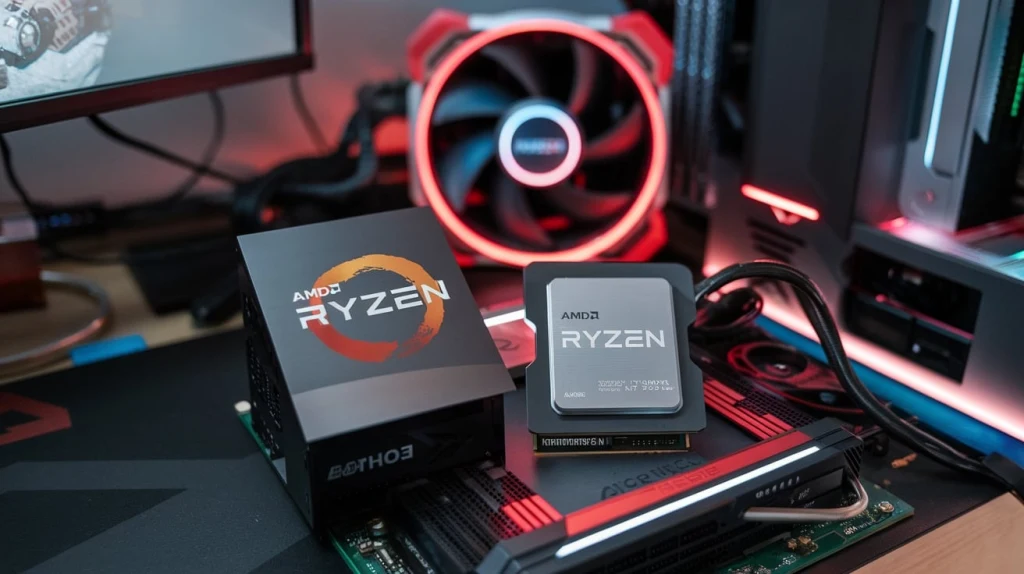
Thermal Performance
For individual users, CPU temperature management can be a concern, especially when running demanding workloads in consumer-grade environments with limited cooling. However, in a data center environment like ServerMania’s, advanced cooling infrastructure completely eliminates thermal challenges—making temperature differences between the Ryzen 9 9950X and Ryzen 9 7950X a non-issue.
In the case of unmanaged environments, our tests show that while the Ryzen 9 9950X operates at higher temperatures. This is a natural result of its increased processing power and efficiency gains with Zen 5 architecture. When deployed in a properly managed server environment with enterprise-grade cooling, it delivers peak performance without any risk of thermal throttling.
Here’s the temperature data for each game we’ve tested on both CPUs:
| Game: | AMD Ryzen 9 9950X[°C – °F] | AMD Ryzen 9 7950X[°C – °F] |
| Spider-Man Remastered | 69°C – 156°F | 65°C – 149°F |
| Cyberpunk 2077 | 78°C – 172°F | 69°C – 156 |
| Hogwarts Legacy | 75°C – 167°F | 62°C -143°F |
| Final Fantasy XIV | 73°C – 163°F | 64°C – 147°F |
| Red Dead Redemption 2 | 🔥82°C – 179°F | 67°C – 152°F |
| As per the data, the obvious winner here is AMD Ryzen 9 7950, with significantly lower temperatures during gaming, even though running at a higher clock speed. The CPUs are away from their heat limit, hence both are a good option for demanding games and tasks. | ||
Important: The precise temperatures during testing can vary based on the computer’s cooling/airflow.
Why Data Center Cooling Makes All The Difference
At ServerMania, we provide:
- 24/7 Temperature-Controlled Data Centers – Servers operate in optimal conditions at all times.
- Enterprise-Grade Cooling Systems – Ensuring peak efficiency, even under maximum loads.
- Performance Without Thermal Limitations – The Ryzen 9 9950X runs at full potential without overheating concerns.
CPUs Power Consumption
Now that we know the operational temperatures, it’s time to review possibly the most important factor–power consumption, especially during production. While power consumption may not be as important for the average PC user, it’s essential for businesses managing multiple AMD servers, where energy adds up over time and decreases hosting costs.
You can explore the power consumption data after the CPU benchmarks:
| Game: | AMD Ryzen 9 9950X[W – Watts] | AMD Ryzen 9 7950X[W – Watts] |
| Spiderman Remastered | ~186 W | ~196 W |
| Cyberpunk 2077 | ~191 W | ~204 W |
| Hogwarts Legacy | ~190 W | ~206 W |
| Final Fantasy XIV | ~179 W | ~198 W |
| Red Dead Redemption 2 | ~201 W | ~217 W |
| ⚡AVERAGE DRAW: | ~189 W⚡ | ~204 W⚡ |
| Based on the average power consumption as per the tested gaming environment, AMD Ryzen 9950X is the clear winner. While the power may vary per different PC configurations, this makes the 9950X a solid choice for minimizing energy usage. However, with the BIOS ECO Mode support settings, you can reduce the power consumption, per different software tasks. | ||
Important: The exact power consumption during testing may vary as per the specific utilization based on many external factors such as other software running in the background.
AMD Ryzen 9 Series Vs Intel Core i9
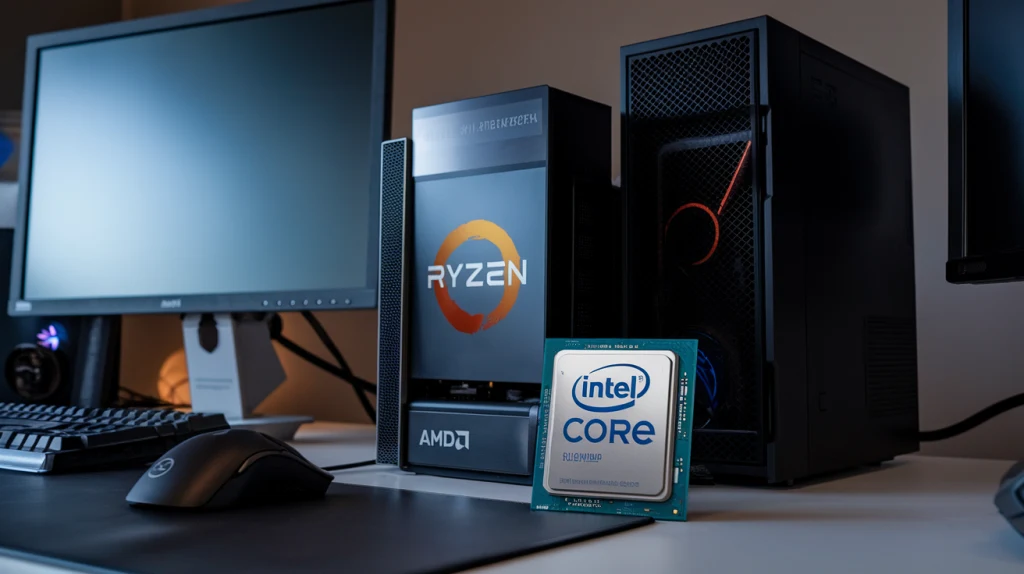
Now that you know the key aspects of the latest gems from AMD, you may be wondering how Intel Core stands up to the competition. Intel vs AMD has been a popular debate since these brands existed, both offering high-end computing, setting the foundation of a new PC era with their latest releases, but the architecture of the chipsets is of course as different as relevant.
While AMD Ryzen 9 lineup offers exceptional multi-core performance with slightly different architecture when comparing 7950X and 9950X, the Intel Core i9 series continues to shine as their main competitor.
When it comes to raw power and performance, AMD’s Ryzen 9 lineup holds the edge with the superior core count and architecture optimization. In contrast, Intel Core i9 processors perform exceptionally well for workstation applications that require high clock speeds.
While both manufacturers guarantee excellent performance, there is no clear winner here. Hence, the chipset brand and CPU depend on your business requirements, usage intents, and purchasing budget.
Note: Now that you know the differences between the CPUs, you may be interested in exploring the AMD and NVIDIA GPU comparison.
Explore Ryzen Series 9 at ServerMania!
CPUs like Ryzen 9950X and 7950X make our services future-proof, which can surpass the expected performance, and fulfill any software tasks with an ultimate power efficiency.
We also provide Series 5 CPU options such as Ryzen 7600X and Ryzen 5600X, catering to users with budget limitations and enabling complete customization. Whether you’re struggling with enterprise tasks, purchase dilemmas, or future-proofing, power up your business with the Ryzen architecture.
Feel free to explore ServerMania’s hosting solutions today to compare CPUs and make informed purchases!
Was this page helpful?

